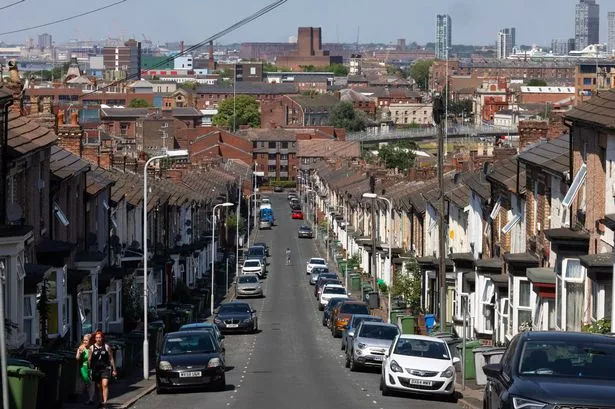On a cold winter’s day, everyone needs a hot meal and a warm place to sit. The moment you enter the doors of Birkenhead’s Number Seven community café, you’re made to feel at home.
The cafe, which was founded in 2018 to help people avoid food poverty, is located in Birkenhead and Tranmere, an area where men have a life expectancy of just 71.1 years. This is almost eight years less than the national average male life expectancy of 79 years.
The ECHO has previously reported on the stark inequalities across the five boroughs – notably on the Wirral. According to Office for Health Improvement and Disparities data, women living in Wallasey can expect to live up to 86.5 years, while those living in Bidston and St James have a life expectancy of 77.5 – a difference of nine years.
READ MORE: Dad stunned after showing fan his phone at Liverpool FC match
READ MORE: Where else would you like the night bus to go to?
This week the ECHO went to Number Seven to get people’s thoughts on the quality of life in Birkenhead. The customers we spoke to showed deep concern and compassion for those around them, and defied being pigeon-holed.
Terence, 61, and Tom, 62 are regulars at the café. Both men moved here from Liverpool several years ago – Terence to be near his sisters and Tom to move into supported housing. Terence suffers from type two diabetes and is insulin-dependent. He says he is “surviving” but generally happy with his quality of life, with his family living nearby.
Tom is a reformed alcoholic who hasn’t touched a drop in the five years since he left Liverpool. He disputes the idea that Birkenhead is a worse place to live than anywhere else, but he does say he was shocked to discover it wasn’t as posh as he thought it was when he was growing up in Bootle.
He said: "Everywhere is the same really, there’s poor, there’s rich and there’s in between. Drug addicts, alcoholics and normal people. There’s good and bad everywhere. My quality of life is all about sobriety.”
Tom has taken steps to improve his health. When he started to gain weight after stopping drinking, he cut out sweets and chocolate and lost three stone. Not everyone has Tom’s willpower, though. The issue of healthy eating comes up time and again in conversations at the café.
Caroline Noble, who has been working in Number Seven since its launch in 2018 said: “People often don’t have access to decent food. Diet is one of the fundamentals to a long, well-lived healthy life, and there are issues around lack of access – whether that’s because of economics, or because of knowledge about what makes a nutritious meal.”
Someone who knows how to make a nutritious meal is Ellen, 79. She is seated opposite her husband George, 90, who worked as a furniture upholsterer until he was 80. George’s diet may well be a factor in his longevity. Ellen says: “We eat well. Everything is cooked from scratch. It’s not processed. If I get a chicken for dinner on a Sunday, on the Monday I’ll strip it down and do a curry, then I’ll make a pan of soup. Nothing gets wasted.”
They have had their share of health concerns. George has had three hip replacements, a knee replacement, open heart surgery and recently had a hernia operation. Ellen has COPD – a chronic chest complaint. “I did smoke,” she says, “but it was years ago.”
Ellen says healthcare provision in the borough is good, but that she and George struggle to get a GP appointment when they need one. She said: “Trying to get into the doctor’s is a nightmare. I phoned up the other morning right on 8 o’clock and I was number 54 in the queue. I was told to go online, but I can’t get onto it.”
Everyone at the café has been hit by the cost of living crisis. Keeping warm at home and having the means to cook hot food is a serious challenge for many in the area. Caroline said: "We notice it particularly in the winter with our elderly customers, a number of our customers will come in in the morning for tea and a breakfast cooked here at half price means they aren’t necessarily cooking a hot meal at home using electricity." According to the Wirral Intelligence Service, as of 2021, more than one in four households in Birkenhead West were estimated to be in fuel poverty.
Cllr Janette Williamson, Chair of Wirral’s Adult Social Care and Public Health committee, said: “We know that health is closely linked to the conditions in which people are born, grow, live and work. Evidence shows us that addressing the root causes of these differences is crucial if we want to tackle health inequalities and bring about lasting, sustainable improvements in our borough’s health.”
Wirral Council has committed to the borough becoming a “Marmot Community”, following the recommendations set out in the Marmot Review on health inequalities. This means addressing the root causes of ill-health and inequalities and making sure every child has the best possible start in life.
All the people the ECHO spoke to in the Number Seven café were socially active and resourceful people taking steps to improve their quality of life. For those who fall through the cracks and don’t access the life-enhancing social amenities on offer in the area, the story is likely to be very different. As Wirral native Eileen, 82, says: “I think it shows a poor quality of life when people don’t look happy – and you do see that around here. I’m doing okay, but I know a lot of people who are struggling."
The Liverpool Daily Post newsletter delves into the biggest stories on Merseyside.

